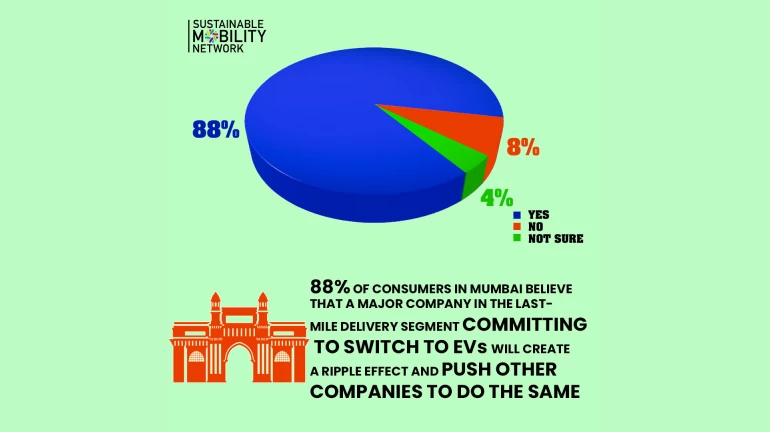
A new consumer survey conducted by CMSR Consultants and commissioned by the Sustainable Mobility Network with support from key Maharashtra partner- Waatavaran, shows strong support from city consumers (at 66% of all respondents) for the EV policies of the state of Maharashtra which require time bound transition plans from delivery companies and also indicated a strong preference to prioritize purchases from progressive companies which are in line with and make commitments to the state government targets to rapidly decarbonize their fleets. Maharashtra state, as part of its overall EV policy, sets a 25% target for EV vehicles among e-commerce, delivery and logistics service providers in the state by 2025.
“The findings of the survey indicate strong support for the policy direction on delivery sector emissions in Maharashtra. Along with the central government Niti Aayog’s Shoonya campaign, which actively looks to decarbonize the last mile delivery sector, delivery companies should come forward to work closely with our government to ensure rapid transition of their fleets.” said Bhagwan Keshbhat, CEO of Waatavaran.
The survey among 1508 Mumbai consumers, conducted as part of a nationwide survey including 5 other Indian cities- Pune, Delhi, Kolkata, Bangalore and Chennai, also shows that 83% of all Mumbai respondents attributed last mile delivery vehicles as one of the reasons for rising air pollution in the cities, with 88.7% affirming a switch to EV vehicles by the delivery companies as important to addressing air pollution issues and mitigating climate change.
“All of us are increasingly impacted by deteriorating air quality, pollution and the impacts of climate change and the survey bears witness to this stark reality in the Maximum City of Mumbai. Deployment of zero emission fleets by these companies would help considerably in having cleaner air in our congested city, reduction in our overall carbon emissions, and of course, savings for the gig workers who are bearing the brunt of rising fuel costs”, added Keshbhat from Waatavaran.
The survey, primarily conducted offline (96%) through on-ground interviews, also finds that an overwhelming majority of respondents (88%) believe proactive action and transition by one company can encourage other companies and create rapid change in the sector. The companies identified as part of the survey include Amazon, Flipkart, Swiggy and Zomato as the most frequently used, with the other companies being grocery/ hyperlocal and logistics companies like Bigbasket, Dunzo, Blinkit/ Grofers, JioMart, MilkBasket, Bluedart, Fedex, Gati etc.
"E-commerce, food and grocery/ hyperlocal deliveries are a rapidly growing segment in India," said Gajendra Rai, Director of CMSR Consultants. “Tier 1 Cities like Mumbai comprise the core market for most of these delivery companies so our survey of Mumbai consumers is highly indicative of overall consumer perception of the companies and their current use of delivery vehicles. We have also tried to ensure that of the nationwide respondents, the maximum respondents are from the 18-45 age group (93%) who again represent the core user base for the companies,” he further added.
The respondents nationwide also stressed the need for a socially just transition of their delivery fleets by companies with 38 percent stressing that companies should either lease or purchase electric vehicles for their delivery partners/workers, 31 percent respondents saying companies should provide financial incentives to delivery partners for buying electric vehicles and another 19 percent stating that support should be provided to the delivery partners to retrofit their existing delivery vehicles.
Respondent Profiles:
42 percent of the respondents were in the 26-35 age group, 27 percent in the 18-25 age group, 24 percent in the 36-45 age group, and 6 percent of the respondents were above the age of 46.
58 percent of the respondents were male and 42 percent were female.. Pune had the highest representation of male respondents (83%) while concentration of female respondents was highest in Mumbai (70%).Pune:
Pune has the highest percentage of respondents (85%) who believe that emissions from delivery vehicles impact air quality.
Pune has the highest percentage of respondents (99%) who believe that one company rapidly adopting EV will encourage and create a ripple effect among other companies.
Pune has the highest percentage of respondents (77%) who believe companies need to be proactive to transition their fleets to EVs.
78 percent of the respondents in Pune and 66 percent in Mumbai would prefer to shop from delivery companies if they pledge to meet the targets in the Maharashtra EV policy which mandates that the companies should transition 25 percent of their fleet to electric vehicles by 2025
Mumbai:
Reports stated that 66 per cent in Mumbai would prefer to shop from delivery companies if they pledge to meet the targets in the Maharashtra EV policy which mandates that the companies should transition 25 percent of their fleet to electric vehicles by 2025.
Recent research on last mile delivery emissions for Mumbai is estimated to be:
City | Annual Number of Parcels Estimated (in billions) | Estimated Last Mile Delivery Emissions (t CO2 rounded) |
Mumbai | 0.4 | 80,000 |





